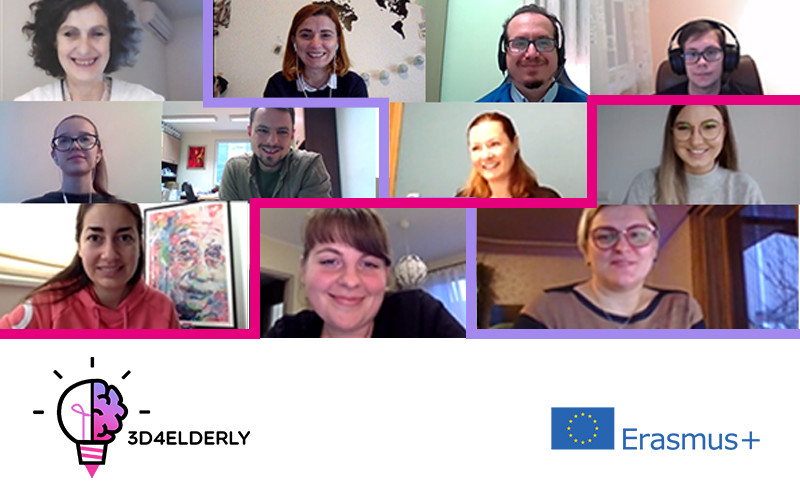Project name: 3D4elderly – 3D printing to create innovative learning pathways for caregivers and staff members dealing with people with Alzheimer and elderly people with dementia
Project number: 2020-1-LT01-KA204-077896
Duration: 22 Months
Coordinator: BETI – VIESOJI ISTAIGA BALTIJOS EDUKACINIU TECHNOLOGIJU INSTITUTAS (Lithuania)
Financed by: European Commission under the programme Erasmus+ KA2 – Strategic Partnerships for adult education
Partners: CEIPES – CENTRO INTERNAZIONALE PER LA PROMOZIONE DELL’EDUCAZIONE E LO SVILUPPO ASSOCIAZIONE (Italy), CETEM – ASOCIACION EMPRESARIAL DE INVESTIGACION CENTRO TECNOLOGICO DEL MUEBLEY LA MADERA DE LA REGION DE MURCIA (Spain), ABA – гражданско сдружение Алцхаймер България (Bulgaria).
On the 8th January 2021 the KOM of 3D4elderly – 3D printing to create innovative learning pathways for caregivers and staff members dealing with people with Alzheimer and elderly people with dementia took place in an online meeting due to the COVID-19 emergency.
The KOM was organized and managed in an excellent and productive way thank to the great organization of the coordinator of the project and the cooperation of all 4 partners from different European countries, backgrounds and expertise.
3D4elderly is a project aimed to create innovative learning pathways that increase the quality of the work of caregivers and staff members dealing with people with Alzheimer and elderly people with dementia and also to raise the quality of the life of the patients by using 3D technology.
Alzheimer is a degenerative neurological disease that affects the brain, progressively leading the patient to a state of total dependence, thus creating a very complex and difficult situation for people who take care of them. The causes of the disease are still unknown but there is a multi-factorial origin connected to various factors such as genetics, environment and lifestyle.
In addition, an important factor is the age, indeed the disease develops mainly between 75 and 85 years of age, however, this may not always also affect some younger people, while others older, over eighty or even centenarians may not find it at all.
One of the first symptoms of an Alzheimer’s patient is short-term memory loss.
Some research stated that it is possible in the early stages of Alzheimer’s to recover lost memories, stimulating specific hippocampal neurons, the area of the brain responsible for recording short-term memories. For this reason, people with Alzheimer need cognitive stimulation exercises that stimulate memories, language, perceptions, reasoning, creativity, sociability and above all well-being.
The use of 3D printing will help these people by offering them a multisensory experience thanks to the tools created. This technology can be useful to support visual, tactile and therapeutic methods. The hands-on experience and this technology will help the person to receive an infinite
number of requests which have a direct action on the brain areas connected to instincts and senses, with positive effects on the cognitive and relational sphere.
To achieve the goals of the project, the consortium has defined the following intellectual outputs:
• IO1: A guideline for caregivers about the use of 3D Printing.
• IO2: A set of memory exercises created with 3DP for helping people with Alzheimer and elderly people with dementia.
• IO3: A web platform to collect exercises created with 3DP to be used with people with Alzheimer and dementia.
• IO4: A Training for experts, caregivers and other staffs involved in the work with people with Alzheimer and elderly people with dementia.
• IO5: Creation of a methodological guideline (therapy guide) to assist in the improvement of memory in Alzheimer’s patients and those with early-onset dementia accessible to all Alzheimer centers.
The aim of the project also follows the goal of the European Alzheimer’s Alliance, an institution that was established in the European Parliament (EP) in 2007. It is a non-exclusive, multinational and cross-cutting group that brings together members committed to supporting Alzheimer’s Europe and its members by tariff so that dementia becomes a priority of the public health in Europe.
Regarding the KOM, it was held following a structured agenda. Partners discussed different topic. In a first moment ABA, the expert of Alzheimer, explained in a detailed way the topic, to make partners aware about the difficulties and problems that people with Alzheimer have to face.
In a second part leaders of the IOs presented all the activities that the consortium of partners should undertake during the lifetime of the project.
In the last part the coordinator explained all the managerial and financial rules to conduct the project and the leader of the Quality assurance and Dissemination gave an overview to partners regarding these two important aspects of the project.
Partners will meet again on the 9th February for a quick online meeting to monitor the progress.
Please to know more about the project follow our social media accounts on Facebook, LinkedIn, Instagram and Twitter.
